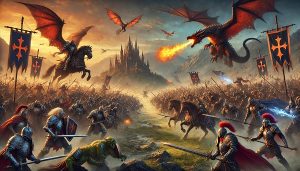
Epic fantasy is a genre that transcends ordinary storytelling, whisking readers away to intricate worlds brimming with magic, heroism, and complex characters. This article delves into the captivating domain of epic fantasy, exploring frequently asked questions, and reviewing notable books, each bringing unique elements to the genre. Whether you’re a seasoned reader or a newcomer, this guide will help you navigate the rich tapestry of epic fantasy literature.
Frequently Asked Questions About Epic Fantasy
1. What Defines Epic Fantasy? Epic fantasy typically involves grand narratives set in detailed, imaginary worlds. These stories often feature a struggle between good and evil, vast landscapes, complex social hierarchies, and a significant amount of magic or fantastical elements. The characters are usually involved in a quest or adventure that has far-reaching implications for their world.
2. How Does Epic Fantasy Differ From Other Fantasy Genres? While all fantasy genres involve some element of the supernatural or fantastical, epic fantasy is distinguished by its scope and scale. Unlike urban or low fantasy, which might set magical elements in real-world settings or focus on smaller, personal stories, epic fantasy spans entire continents, kingdoms, or even universes. The stakes are often high, involving the fate of nations or worlds.
3. What Are Some Classic Examples of Epic Fantasy? The genre boasts several monumental works that have shaped its landscape. J.R.R. Tolkien’s The Lord of the Rings is often cited as the quintessential epic fantasy series. Other notable examples include George R.R. Martin’s A Song of Ice and Fire, Robert Jordan’s The Wheel of Time, and Ursula K. Le Guin’s Earthsea series.
4. How Do Authors Create Such Complex Worlds? World-building is a cornerstone of epic fantasy. Authors spend significant time developing their worlds’ histories, geographies, cultures, and languages. This depth makes the fictional worlds feel real and immersive. Writers often draw on mythology, folklore, and historical events to flesh out their universes.
5. Why Is Epic Fantasy So Popular? Epic fantasy offers an escape from the mundane, transporting readers to places where anything is possible. The genre’s intricate plots, complex characters, and expansive worlds allow for deep immersion. Additionally, the universal themes of good versus evil, heroism, and adventure resonate with a broad audience.
6. Can Newcomers Easily Start Reading Epic Fantasy? Absolutely! While the genre can be daunting due to the sheer size and complexity of many works, there are plenty of entry points for new readers. Books like The Hobbit by J.R.R. Tolkien, Mistborn by Brandon Sanderson, and The Name of the Wind by Patrick Rothfuss are excellent starting points.
7. What Role Does Magic Play in Epic Fantasy? Magic in epic fantasy varies widely from one series to another. It can be a pervasive force that shapes the world and its societies, or a subtle, rare occurrence that adds an element of wonder. Magic systems often have rules and limitations, adding depth and intrigue to the story.
8. How Does Epic Fantasy Handle Themes and Morality? Epic fantasy often explores profound themes such as power, corruption, sacrifice, and redemption. The moral landscapes in these stories can be complex, with characters facing difficult choices and moral dilemmas. This depth adds to the richness and appeal of the genre.
Book Reviews: Delving into Epic Fantasy Masterpieces
The Way of Kings by Brandon Sanderson
Pros:
- Intricate World-Building: Sanderson’s world of Roshar is meticulously crafted, with diverse cultures, unique magic systems, and detailed landscapes.
- Complex Characters: The novel features a large cast of well-developed characters, each with their own arcs and personal struggles.
- Engaging Plot: The story is a blend of political intrigue, personal growth, and epic battles, keeping readers hooked throughout.
Cons:
- Dense and Slow-Paced: The depth of the world and the slow unfolding of the plot can be overwhelming for some readers.
- Length: At over 1,000 pages, it’s a commitment that may deter those looking for a quicker read.
A Game of Thrones by George R.R. Martin
Pros:
- Realistic Characters: Martin’s characters are richly developed, with morally gray decisions that make them feel lifelike and relatable.
- Intricate Plot: The intertwining stories of politics, power, and betrayal create a compelling narrative.
- Expansive World: Westeros and beyond are described in great detail, offering a fully immersive experience.
Cons:
- Graphic Content: The series is known for its explicit violence and mature themes, which may not appeal to all readers.
- Complexity: The numerous characters and plot lines can be difficult to follow.
The Name of the Wind by Patrick Rothfuss
Pros:
- Beautiful Prose: Rothfuss’s writing is lyrical and poetic, making the story a pleasure to read.
- Unique Magic System: The novel features an innovative approach to magic, blending science and mysticism.
- Compelling Hero: The protagonist, Kvothe, is a complex character with a fascinating backstory and a blend of strengths and flaws.
Cons:
- Pacing Issues: Some readers find the narrative slow in parts, focusing more on character development than action.
- Unfinished Series: The series remains incomplete, with readers eagerly awaiting the next installment.
Conclusion
Epic fantasy opens the door to limitless adventures and explores themes that resonate deeply with readers. Whether you’re drawn to the intricate world-building, the grandiose tales of heroism, or the complex moral questions, the genre offers something for everyone. Dive into these reviewed books and let your imagination soar through the boundless realms of epic fantasy.
Exploring epic fantasy is a journey through boundless creativity, where every book offers a new world to discover and new characters to meet. Whether you’re a seasoned traveler of these magical realms or just beginning your adventure, there’s always something new and wondrous waiting on the horizon.

